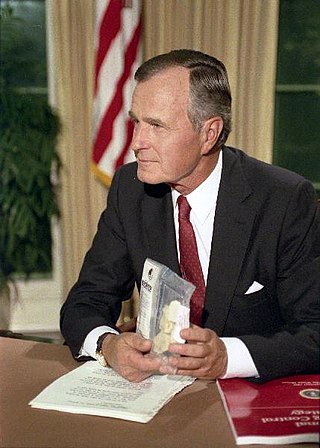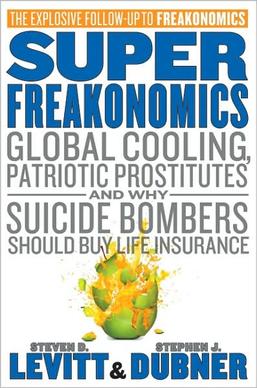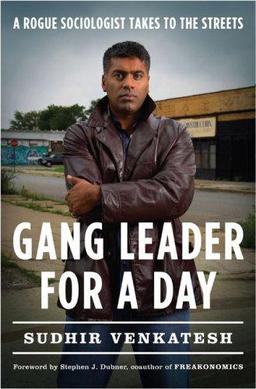
Street prostitution is a form of prostitution in which a prostitute solicits customers from a public place, most commonly a street, while waiting at street corners or walking alongside a street, but also other public places such as parks, benches, etc. The street prostitute is often dressed in a provocative manner. The sex act may be performed in the customer's car, in a nearby secluded street location, or at the prostitute's residence or in a rented motel room.
William Julius Wilson is an American sociologist, a professor at Harvard University, and an author of works on urban sociology, race, and class issues. Laureate of the National Medal of Science, he served as the 80th President of the American Sociological Association, was a member of numerous national boards and commissions. He identified the importance of neighborhood effects and demonstrated how limited employment opportunities and weakened institutional resources exacerbated poverty within American inner-city neighborhoods.

Robert Taylor Homes was a public housing project in the Bronzeville neighborhood on the South Side of Chicago, Illinois from 1962 to 2007. The second largest housing project in the United States, it consisted of 28 virtually identical high-rises, set out in a linear plan for two miles, with the high-rises regularly configured in a horseshoe shape of three in each block. It was located along State Street between Pershing Road and 54th Street, east of the Dan Ryan Expressway. The project was named for Robert Rochon Taylor (1899–1957), an African-American activist and the first African American chairman of the Chicago Housing Authority (CHA). It was a part of the State Street Corridor which included other CHA housing projects: Stateway Gardens, Dearborn Homes, Harold Ickes Homes, and Hilliard Homes.

William Foote Whyte was an American sociologist chiefly known for his ethnographic study in urban sociology, Street Corner Society. A proponent of participant observation, he lived for four years in an Italian community in Boston while a Junior Fellow at Harvard researching social relations of street gangs in Boston's North End.

Steven David Levitt is an American economist and co-author of the best-selling book Freakonomics and its sequels. Levitt was the winner of the 2003 John Bates Clark Medal for his work in the field of crime, and is currently the William B. Ogden Distinguished Service Professor of Economics at the University of Chicago as well as the Faculty Director and Co-Founder of the Center for Radical Innovation for Social Change at the University of Chicago which incubates the Data Science for Everyone coalition. He was co-editor of the Journal of Political Economy published by the University of Chicago Press until December 2007. In 2009, Levitt co-founded TGG Group, a business and philanthropy consulting company. He was chosen as one of Time magazine's "100 People Who Shape Our World" in 2006. A 2011 survey of economics professors named Levitt their fourth favorite living economist under the age of 60, after Paul Krugman, Greg Mankiw and Daron Acemoglu.

Freakonomics: A Rogue Economist Explores the Hidden Side of Everything is the debut non-fiction book by University of Chicago economist Steven Levitt and New York Times journalist Stephen J. Dubner. Published on April 12, 2005, by William Morrow, the book has been described as melding pop culture with economics. By late 2009, the book had sold over 4 million copies worldwide. Based on the success of the original book, Levitt and Dubner have grown the Freakonomics brand into a multi-media franchise, with a sequel book, a feature film, a regular radio segment on National Public Radio, and a weekly blog.

Stephen Joseph Dubner is an American author, journalist, and podcast and radio host. He is co-author of the popular Freakonomics book series: Freakonomics, SuperFreakonomics, Think Like a Freak and When to Rob a Bank. He is the host of Freakonomics Radio.

The crack epidemic was a surge of crack cocaine use in major cities across the United States throughout the entirety of the 1980s and the early 1990s. This resulted in a number of social consequences, such as increasing crime and violence in American inner city neighborhoods, a resulting backlash in the form of tough on crime policies, and a massive spike in incarceration rates.
The Institute for Social and Economic Research and Policy (ISERP) is the research arm of the social sciences at Columbia University, formerly known as the Paul F. Lazarsfeld Center for the Social Sciences. ISERP works to produce pioneering social science research and to shape public policy by integrating knowledge and methods across the social scientific disciplines. ISERP organizes an active intellectual community at Columbia University through its Faculty Fellows program, research centers, projects, and training initiatives.
Elijah Anderson is an American sociologist. He is the Sterling Professor of Sociology and of African American Studies at Yale University, where he teaches and directs the Urban Ethnography Project. Anderson is one of the nation’s leading urban ethnographers and cultural theorists. Anderson is known most notably for his book, Code of the Street: Decency, Violence, and the Moral Life of the Inner City (1999).
Robert J. Sampson is the Woodford L. and Ann A. Flowers University Professor at Harvard University and Director of the Social Sciences Program at the Radcliffe Institute for Advanced Study. From 2005 through 2010, Sampson served as the Chair of the Department of Sociology at Harvard. In 2011–2012, he was elected as the President of the American Society of Criminology.
Beauty B. Turner was an American housing activist and journalist from Chicago, Illinois. At the time of her death, Turner was compared to the civil rights leader Ida B. Wells.
Venkatesh is a given name and family name from the Indian subcontinent derived from Venkateswara, a Hindu deity. Notable persons with the name include:

SuperFreakonomics: Global Cooling, Patriotic Prostitutes, and Why Suicide Bombers Should Buy Life Insurance is the second non-fiction book by University of Chicago economist Steven Levitt and The New York Times journalist Stephen J. Dubner, released in early October 2009 in Europe and on October 20, 2009 in the United States. It is a sequel to Freakonomics: A Rogue Economist Explores the Hidden Side of Everything.
Sudhir is an Indian masculine given name. The Sanskrit word sudhīra means "very wise", "resolute".

Freakonomics: The Movie is a 2010 American documentary film based on the 2005 nonfiction book Freakonomics: A Rogue Economist Explores the Hidden Side of Everything written by economist Steven D. Levitt and writer Stephen J. Dubner. The film premiered at the Tribeca Film Festival in April 2010, and had a theatrical release later that year. On Rotten Tomatoes, the film has an approval rating of 66% based on reviews from 64 critics.

Freakonomics Radio is an American public radio program and podcast network which discusses socioeconomic issues for a general audience. While the network, as of 2023, includes five programs, the primary podcast is also named Freakonomics and is a spin-off of the 2005 book Freakonomics. Journalist Stephen Dubner hosts the show, with economist Steven Levitt as a regular guest, both of whom co-wrote the book of the same name. The show is primarily distributed as a podcast, and is among the most popular on iTunes.

Peter Henry Rossi was a prominent sociologist best known for his research on the origin of homelessness, and documenting the changing face of American homelessness in the 1980s. Rossi was also known for his work devising ways to evaluate federally funded initiatives in education, health services, crime control, and housing. He influentially applied his sociological expertise to affect related policy-making and funding agencies. At his death, he was the Stuart A. Rice professor emeritus of Sociology and the director emeritus of the Social and Demographic Research Institute (SADRI) at the University of Massachusetts Amherst.

Patrick Sharkey is an American urban sociologist and criminologist. He has been Professor of Sociology and Public Affairs at Princeton University since 2019. He was formerly Professor and Chair of the Department of Sociology at New York University, with an affiliation at NYU's Robert F. Wagner Graduate School of Public Service.

Gang Leader for a Day: A Rogue Sociologist Takes to the Streets is a memoir written by Sudhir Venkatesh. The book chronicles the life of the urban poor and explores Venkatesh's views on poverty, money, gangs, drugs, and life in Chicago. In 2017, it was reported that AMC Networks would be developing a drama series adapted from the book.














